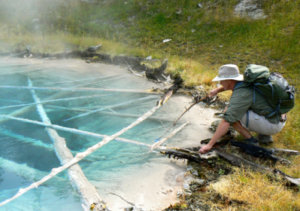The Archaea
 Archaea are found in many harsh environments on the planet, and have adapted to live at extremes of temperature (from Polar ice to superheated water), pressure, pH (from extreme acid pH 0 to alkaline pH 10) and salinity (saturated NaCl in salt pans and the Dead Sea). So archaea are often called “Extremophiles”, but they also constitute a major portion of the biosphere, and are also present in soil, temperate sea water and even the human gut.
Archaea are found in many harsh environments on the planet, and have adapted to live at extremes of temperature (from Polar ice to superheated water), pressure, pH (from extreme acid pH 0 to alkaline pH 10) and salinity (saturated NaCl in salt pans and the Dead Sea). So archaea are often called “Extremophiles”, but they also constitute a major portion of the biosphere, and are also present in soil, temperate sea water and even the human gut.
 To survive in extreme environments like boiling acid, every component of the cell must be adapted: for example proteins must be stable and functional at temperatures where “normal” proteins fall apart.
To survive in extreme environments like boiling acid, every component of the cell must be adapted: for example proteins must be stable and functional at temperatures where “normal” proteins fall apart.
 These adaptations have led to interest in the Biotech and Industrial Enzyme applications of archaeal proteins, and some notable sucesses such as the use of thermostable archaeal DNA polymerases for DNA amplification by PCR. If life is found on other planets it may resemble the extremophilic microorganisms found on the Earth.
These adaptations have led to interest in the Biotech and Industrial Enzyme applications of archaeal proteins, and some notable sucesses such as the use of thermostable archaeal DNA polymerases for DNA amplification by PCR. If life is found on other planets it may resemble the extremophilic microorganisms found on the Earth.
Archaea often inhabit extreme environments, such as these volcanic pools in Yellowstone Park.
http://youtu.be/_YxKB46lFwA